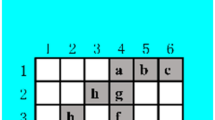Abstract
CNN (convolutional neural networks) have achieved great success in learning features from Euclidean-structured data. While lots of learning tasks require dealing with graph data. In these application scenarios where CNN cannot operate, GCN (graph neural networks) have shown appealing performance and increasing attention in recent years. However, according to our research, the computational complexity and storage overhead of the network also increase, making it a challenge to accelerate on a single FPGA. Accordingly, in this work, we focus on accelerating a deep GCN (DAGCN) on a CPU-multi FPGA platform by proposing a deep-pipelined acceleration scheme. To fully explore the parallelism that exists in DAGCN, we propose a graph convolutional neural accelerator (GCNAR) characterized by integration of a multiple 1-D systolic array. In addition, we also adopt an existing CSR algorithm-based partitioning scheme for large-scale matrix-vector multiplication in the design of our GCNAR, which effectively improves the computational efficiency of GCNAR. Moreover, we develop performance and resource evaluation models to help us determine the optimal design parameters for maximizing the accelerator throughput. Evaluation on real-world graph datasets demonstrates that our FPGA-based solution can achieve comparable performance to state-of-the-art GCN accelerations. In addition, compared to CPU and GPU solutions, our accelerator can achieve 196 times and 115 times the improvement for graph classification respectively in terms of processing latency.
Supported by Supported by organization National Natural Science Foundation of China (NSFC) project 61802420 and National Program on Key Basic Research Project 2016YFB1000401 and 2016YFB1000403.
Access this chapter
Tax calculation will be finalised at checkout
Purchases are for personal use only
Similar content being viewed by others
References
Aliyun: Ali FPGA cloud service. https://www.aliyun.com/product/ecs/fpga
Dou, Y., Vassiliadis, S., Kuzmanov, G.K., Gaydadjiev, G.N.: 64-bit floating-point FPGA matrix multiplication. In: Proceedings of the 2005 ACM/SIGDA 13th International Symposium on Field-Programmable Gate Arrays, pp. 86–95. ACM, New York (2005)
Geng, T., et al.: UWB-GCN: hardware acceleration of graph-convolution-network through runtime workload rebalancing. ar**v preprint ar**v:1908.10834 (2019)
Geng, T., et al.: FPDeep: acceleration and load balancing of CNN training on FPGA clusters. In: 2018 IEEE 26th Annual International Symposium on Field-Programmable Custom Computing Machines (FCCM), pp. 81–84. IEEE (2018)
Guo, K., et al.: Compressed CNN training with FPGA-based accelerator. In: Proceedings of the 2019 ACM/SIGDA International Symposium on Field-Programmable Gate Arrays, pp. 189–189. ACM (2019)
Nakahara, H., **guji, A., Shimoda, M., Sato, S.: An FPGA-based fine tuning accelerator for a sparse CNN. In: Proceedings of the 2019 ACM/SIGDA International Symposium on Field-Programmable Gate Arrays, pp. 186–186. ACM (2019)
Prithviraj, S., Galileo, N., Mustafa, B., Lise, G.: Collective classification in network data. Technical report CS-TR-4905 and UMIACS-TR-2008-04, University of Maryland, College Park, Washington, USA (2008)
Sigurbergsson, B., Hogervorst, T., Qiu, T.D., Nane, R.: Sparstition: a partitioning scheme for large-scale sparse matrix vector multiplication on FPGA. In: 2019 IEEE 30th International Conference on Application-Specific Systems, Architectures and Processors (ASAP), vol. 2160, pp. 51–58. IEEE (2019)
Venkataramanaiah, S.K., et al.: Automatic compiler based FPGA accelerator for CNN training. In: 2019 29th International Conference on Field Programmable Logic and Applications (FPL), pp. 166–172. IEEE (2019)
XILINX: **linx virtex ultrascale+ FPGA VCU118 evaluation kit. https://www.xilinx.com/products/boards-and-kits/vcu118.html#hardware
Yan, M., et al.: HyGCN: a GCN accelerator with hybrid architecture. In: 2020 IEEE International Symposium on High Performance Computer Architecture (HPCA), pp. 15–29. IEEE (2020)
Yang, L., Chen, Z., Gu, J., Guo, Y.: Dual self-paced graph convolutional network: towards reducing attribute distortions induced by topology. In: Proceedings of the Twenty-Eighth International Joint Conference on Artificial Intelligence (IJCAI-2019), pp. 4062–4069 (2019)
Zeng, H., Prasanna, V.: GraphACT: accelerating GCN training on CPU-FPGA heterogeneous platforms. In: The 2020 ACM/SIGDA International Symposium on Field-Programmable Gate Arrays, pp. 255–265 (2020)
Zhao, W., et al.: F-CNN: an FPGA-based framework for training convolutional neural networks. In: 2016 IEEE 27th International Conference on Application-Specific Systems, Architectures and Processors (ASAP), pp. 107–114 (2016)
Author information
Authors and Affiliations
Corresponding author
Editor information
Editors and Affiliations
Rights and permissions
Copyright information
© 2020 Springer Nature Switzerland AG
About this paper
Cite this paper
Cheng, Q., Wen, M., Shen, J., Wang, D., Zhang, C. (2020). Towards a Deep-Pipelined Architecture for Accelerating Deep GCN on a Multi-FPGA Platform. In: Qiu, M. (eds) Algorithms and Architectures for Parallel Processing. ICA3PP 2020. Lecture Notes in Computer Science(), vol 12452. Springer, Cham. https://doi.org/10.1007/978-3-030-60245-1_36
Download citation
DOI: https://doi.org/10.1007/978-3-030-60245-1_36
Published:
Publisher Name: Springer, Cham
Print ISBN: 978-3-030-60244-4
Online ISBN: 978-3-030-60245-1
eBook Packages: Mathematics and StatisticsMathematics and Statistics (R0)




